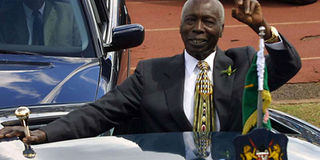Moi is gone and Nyayo era past tense, but the impunity lives on

President Daniel arap Moi waves to the crowd as he leaves Nyayo National Stadium after officiating Jamhuri Day celebrations on December 12, 2002. He oversaw looting of public resources. PHOTO | SIMON MAINA | AFP
What you need to know:
- Kenyans had hoped that the impunity Moi had entrenched for 24 years would end with the election of Mwai Kibaki in 2002.
- In 2004, the Kibaki regime also suffered a credibility blow when the president’s key allies were implicated in the Anglo Leasing scandal.
In the biography Moi: The Making of an African Statesman, Andrew Morton traces the life and career of Kenya’s longest-serving leader.
The overriding theme of the book is to challenge widespread accusations that President Daniel arap Moi was a dictator who oversaw looting of public resources and rights abuse.
Morton writes about an analogy Moi narrated to him that may explain why his tenure was such a disaster.
Of his ministers and others around him, he said: "They are like a balloon. You inflate it with air and then just a small pin prick and it goes burst."
And Moi burst Kenya in many ways. The financial looting that brought the economy to its knees in his last years in office, grabbing of public land that was detrimental to the environment and institutions, and widespread human rights abuses that broke many families are some of them.
To understand the disastrous effect on Kenya of Moi’s rule, read the several official reports, some of which he commissioned, in a ploy to deflate public pressure. They include the Kiliku and Akiwumi reports on ethnic violence, done during his tenure.
REPORT DISMISSED
As the political pluralism struggle intensified, Moi ominously warned that it would bring chaos.
As if to fulfil his prophesy, bands of warriors sponsored by Kanu politicians roamed the villages burning homes, killing and maiming men, women and children.
Torture chambers set up in the basement of Nyayo House, Nairobi, ruthlessly dealt with Moi’s middle-class opponents like university lecturers and students, journalists and politicians. Many were killed.
The Kiliku and Akiwumi reports bare all. Kennedy Kiliku, then the Changamwe MP, chaired a parliamentary committee to inquire into the pre-1992 election violence mostly in and around the Rift Valley.
The team heard testimony that senior Moi henchmen had financed groups of “warriors” to cause inter-tribal violence at rallies in 1991.
The committee’s report recommended that the inciters be investigated further, but Parliament, under the heavy influence of Kanu’s deep state, threw it out as being “shallow, malicious and inadequate”.
POST-VOTE CHAOS
Nobody was held accountable for the suffering of thousands of Kenyans. Little wonder that the same perpetrators returned with a vengeance in the 1997 elections.
After the elections in 1998, Moi appointed a Judicial Commission to Inquire into Tribal Clashes chaired by Mr Justice Akilano M. Akiwumi.
I reported its proceedings for the Daily Nation when it came to Eldoret, the hub of North Rift. Witnesses narrated the impunity of the warriors who operated as police watched.
The recommendations of the report also came to naught. In fact, it was not released to the public until 2002, following a court order. It called for prosecutions of the same suspects as in the Kiliku report.
It is this impunity that set up the mother of all chaos after the 2007 elections. The International Criminal Court intervened for those seen to have been most culpable among the ‘big fish’.
It ended in all of them evading justice after a ruthless campaign of threats and murder of witnesses. The ‘small fish’, too, still roam free.
KIBAKI SCANDALS
Kenyans had hoped that the impunity Moi had entrenched for 24 years would end with the election of Mwai Kibaki in 2002.
Kibaki commissioned the Kroll report, “The Looting of Kenya”, and the Ndung’u report on the illegal allocation of public land.
Kroll revealed that Moi stole billions of dollars in public funds using a “web of shell companies, secret trusts and frontmen” and secreted the loot in 30 countries, and his “relatives and associates siphoned off more than a billion dollars of government money".
But Kibaki did not act on the report. The loot was never recovered or anyone prosecuted.
In 2004, the Kibaki regime also suffered a credibility blow when the president’s key allies were implicated in the Anglo Leasing scandal.
None of the recommendations of these reports were ever implemented. Moi (and Nyayo) is gone but the impunity of his tenure continues to ravage us.
Mr Wanyonyi is a journalism trainer and independent editor. [email protected].




